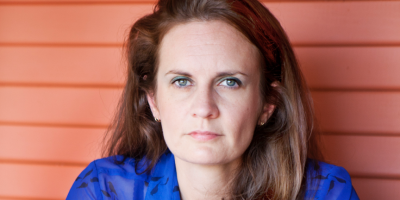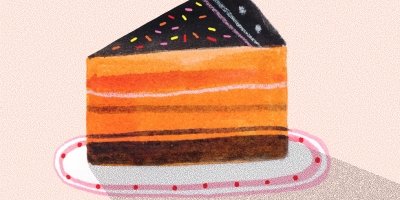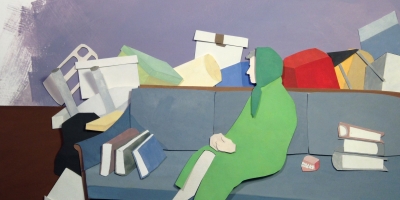Memoir
Iced Cake Frosting
by Sarah Maria Medina

The roosters have begun to crow. A staleness of fowl from the neighbor’s yard steals through the closed shutters of the bedroom window. Divinity stirs, and I scoop her into my arms, eyes creased to the morning sun. Outside, the broken ladder leans against the roof above Achi’s room. My daughter’s uncle sleeps, his door shut to the morning cold. I would climb the wooden ladder before I was pregnant, sit on the roof, and watch the sun sink behind the houses. A stray cat, thin and almost broken, slinks by me, its coat sticky with dirt. I bend below the roof eave, shuffle across the dirt path, shallow dust prints left behind.
In the front yard, I hang Divinity over the plants outside. I scoop water from the big tin buckets that reach above my waist, pouring it over her tiny bum.
“Yuniel.” My breath hovers hesitant in the hazed morning light. He told me to call him when we woke.
My eyes are swollen from fatigue, from night nursing. My white ankle-length nightgown, a thin loose cotton, becomes wet as I scoop one final tin of water. With my hair tangled, I feel beautiful in a raw, morning kind of way. The kind of beauty that new mothers sometimes hold. Then exhaustion makes my arms heavy; my swollen lids turn from the sky.
“Yuniel.” I call his name a second time, morning folded in thick around us. Not like when I was last to wake, sounds of his house filtering in through the window. I wrap a towel around Divinity, pull her to my chest.
Laughter pours from the cracked wooden shutters of the front bedroom. The paint is chipped, dirt ground below the window, a lone plastic bucket overturned, aged from sun. I furrow my brows. Bile rises from my stomach. He likes his women in the morning, I remember, wetness clinging my worn gown to my ankles. I press Divinity against me, and shuffle in my chancletas back to my room, careful to bow below the roof edge that juts out from the eave.
Morning rituals unfold: the television drones from Achi’s room, his tall frame bends into the kitchen. He makes coffee. Then Grisel, my daughter’s grandmother—her delicate step from the bedroom into the kitchen, her white oversized knit sweater hung from her shoulders, left from a time when there was more food in the house, when her body was thicker, filled with nights of fried plantains and yucca. Now her belly, softened from four children, sags into her thinness. Achi takes Divinity into his wide scarred hands as the coffee heats.
“Voy a preparar unas tortillas. ¿Te preparo una también?” His voice thick from sleep, doubled with hope for the morning, lightens the kitchen’s perpetual shadows.
Grateful, I smile up at him, too tired from night nursing to cook. He steps outside to the patio, lifts Divinity’s smiling face to the blue sky. His girlfriend and her daughter still huddle below the sheets while cold light sneaks into the room. I sit in the red chair by the doorway, and Achi passes Divinity back to my arms so that I can nurse her.
Yuniel, having just washed with the tin canisters in the front yard, towels dripping water from his face. “¿Qué necesitabas?” The words fall from his mouth, his voice almost a song. His body reeks of sex, his morning bed.
I shrug my shoulders, say, “Nada, nothing, I need nothing,” or “Ya no importa,” or some mumbled response, and turn. The image of him in the front room weighs dense: the fan off, the warm morning air beginning to circulate with the coolness from night. I try to push the image of Chiquinquirá bent against him from my mind, her tallness pressed in need to his stomach. Achi takes Divinity, and I slouch further into the red chair, the rooms of this house pressing down against my spirit.
A depressed anger shifts against my ribcage, bloats my stomach. The sobbing that overtook my body back in the forest when I read Yuniel’s letter, breaking our engagement, has ebbed, and what is left is a dull acceptance of his affair with Chiquinquirá. A shame hovers, shame that his family made promises they couldn’t keep: his new wife, Chiquinquirá, is sleeping below the same roof as my daughter and I, her visit extended. This house by the sea has become a place of tension, dusty rooms, far from the brilliance of the water’s edge.
I think of the distance to the payphone, the effort of finding a few centavos, the dust heat struck road, the wait in line to call my ex-girlfriend, Honor, at her apartment in Cero, in the center of Havana, where she now sleeps next to Imea. Honor was given an apartment by the newspaper Granma, and the Soviet concrete building is filled with revolutionaries. She’d invited me to stay with her, but before I flew in, she wrote that if I was caught with her, Imea would also have to leave. Imea had already lost her previous room after the neighbors reported her illegal residency. Maybe they’d seen her kiss Honor at dusk. I could still stay if I had to, but we would have to be careful. I kept her number, but I haven’t yet walked to the payphone outside of the almost-empty bodega where stray dogs gather in packs at night.
In Playa, where I rented the mango-tree apartment, and here in Yuniel’s barrio, families struggle to get by, keep their heads down to neighbors slinging bootlegged rum and stolen goods on the black market. One more foreign woman hidden in the back of the house doesn’t make a difference in the poverty of things. I wanted my daughter to know her family: uncle, cousins, aunts. Her grandmother. Her father. This country. I will call Honor, just not this morning.
I slouch into the chair, shoulders hunched. The torn leather rubs against my shoulder blade. Then, knowing that pouting isn’t attractive, I sit up, try to take on nonchalance, and roll my hair into a bun. Achi takes Divinity to the patio, raises her up to the morning sun again. Her seeds of laughter fall to the concrete patio floor. Watching Divinity outside below the sky with her uncle, something like peace is nourished within me. The beginnings of joy. Then Chiquinquirá walks into the kitchen, takes a plate of cake: white with sugar-white frosting.
Morning, a wash of familiar barrio sounds: stray cats, the caged fighting roosters three houses down, ducks behind the bedroom-window slats, the television constant. Achi’s chekeré raises Santería rezos in the back shack, past the sad ancient turtle in the aluminum basin of muddy water meant to bring prosperity, past the plants where an occasional neighbor walks quiet to the shack to make an ebbo for work or love as Achi raises his thick strong hands meant for building to the sky, selecting words that come back down. He hands them to the neighbor, to their Santo, to the earth, to the sea, the salt.
The clouds weighted, the rain listens for a sign from the sky gods. Humidity makes pearl drops on Divinity’s skin. My light blue dress slouches over my body. It was too large when my father bought it for me after Divinity was born. My sister and I had gone to a sale, some samples that a designer was selling from the season before. I had chosen the dress for the soft fabric, for the largeness. Now, after nursing for eight months, it pools around me, almost slides off my body, the thin blue cotton an uncontrolled river of water over my still pale skin.
Chiquinquirá gossips in the kitchen with my daughter’s aunt, Yuyi, then walks by me, down the path behind the kitchen. Caracas style: golden pants that drop from her pelvis down to her knees like a South American MC Hammer, and a golden long-sleeved jacket, cut above her hipbones, her hair done out in an afro. She bends her shoulders below the low roof eve, sways her hips. I watch through slanted eyes, noticing the thin gold chain wrapped around her waist.
I glance up, and Yuyi smiles, her eyes following mine, following Chiquinquirá as she throws her hips in wider circles until she disappears back to her room. Heat rises against my face. I know Yuyi could tell I was watching Chiquinquirá’s gold waist shake and shimmer under the slanted roof eave, could sense I was comparing myself to Chiquinquirá. A beauty, taller than me, her thighs thick like mine, her curves round. Her shoulders wide like mine, her arms long. Her stomach full from bread. Her breasts small teacups, mine swollen with milk.
The mischievous way she looks out from her eyes, and her mouth full of self-assured words that reach the sky and the moon before morning has turned hot. Sometimes when she wears makeup, bright green eye shadow with loads of mascara, bright pink blush, and lipstick, she is pretty like a drag queen, a masculinity hidden behind her feminine stature. Her arms swing in gestures of attitude, tall like a man in high fancy tacones, her toes show through the opening of the shoe. Her skin is a rich brown, while mine is pale, golden only under the Caribbean sun. They call me La Pálida, the pale one, behind my back.
Other cubanas, in sympathy, tell me Chiquinquirá is not like them. They say she’s got money, ties to Germany. And that makes her different from the women who grew up on ration lines, on the learned waiting, on scraped knees playing in the streets of the dirt barrio road. There was the gossip hushed voice in Achi’s room late at night, but none of the skepticism around Yuniel’s relationship with Chiquinquirá can make this house my home again, and maybe it never was.
When Yuniel wrote his letter, when he said he wasn’t coming to meet me in the States, months after I had sensed her there with him in the barrio’s folds and secrets, I called long-distance to Havana, the phone lines crackling.
“¿Me escuchas, me escuchas?”
“Sí, te escucho, Sarah María.”
Uncertain how long the phone connection would last, my dollars burning into the telephone wire, I begged him to tell me the truth. To tell me if he had forgotten the last time we had been together, asked him to remember the last time he was inside of me, and then asked him if he still loved me, and he said yes, his voice softening into my desperation, into the cold spring of my cabin in the forest. I wasn’t trying to save my relationship, I was fighting for my daughter to have a father.
In the television static, I think about Chiquinquirá’s resemblance to my own grandmother. I think of how I hold my hand on my hip, the way my grandmother used to, the way Chiqui does. I think about displayed pride in the stance of our hands on our hips, and how I seem to have lost so much of that prideful attitude.
There is something attractive about all that attitude, I think, the way Puchi told Hector Lavoe to get his other woman out of the studio when she arrived, knowing her place, demanding her place. In Seattle, I would wear hoop earrings, my bottle black hair pulled back in a ponytail. I would let my head move, my chin following as I stated my opinions, wrist bangles clanging as I gestured and laughed. My mouth painted, my jeans tight, always dressed in just-below-the-knee-high suede boots of one color or another. Now all that has faded. Now there is just my oversized dress that falls over my body like a tent, my hair almost blond again from the sun, a former version of my mother when she birthed my sister, her eyes tired and swollen, exhausted by my father leaving.
Yuyi, still dressed in the outfit she had gone out in the night before, heels and a purple flower dress, opens the refrigerator with the persistent night hum. Her perfectly manicured nails finger the small Jehovah’s Witness cross nestled between her breasts. After her second son died, her scar new across her stomach, the church called her. She takes a wedge of cake, wipes frosting from her mouth with the back of her wrist.
Chiquinquirá walks back into the dim kitchen, lit by one stark bulb, to say goodbye to Yuyi, and Yuniel follows her. He is dressed in colors that complement her style. Deep earthen brown and gold. The new gold watch that she bought for him shines bright from his wrist. My stomach tightens as they kiss in the small dusty kitchen. Yuyi smiles. “¡Eso!” she says. I sink further down into the seat, stare at the television which drones on before me.
Yuniel teases Yuyi about being awake early, implies that she has just come home from a night out. “Te vestiste bonita tan temprano.”
Her eyes become round as though she has been caught. Yuniel laughs. Yuyi, a strong woman, in control of her sexuality, turns modest as her brother teases. She holds the last slice of cake in her hands, fills her mouth with the frosting, a look of guilt wiped across her face. Then she uses her perfect, magenta-manicured index finger to steal more frosting from the edge of the cake wedge.





